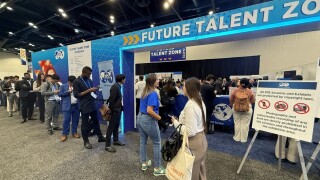Human resources
Major increases in hydrocarbon production require both incremental and revolutionary technologies, industry leaders said during the SPE Hydraulic Fracturing Technology Conference.
The Career Advancement Network held its 16th semiannual Energy Professionals Hiring Event at SPE’s 2025 Annual Technical Conference and Exhibition, allowing participants to connect with employers, explore opportunities, and seek information about job opportunities in a rapidly evolving industry.
This paper explores the evolving role of the digital petroleum engineer, examines the core technologies they use, assesses the challenges they face, and projects future industry trends.
-
Panelists from energy companies around the globe gathered to share their personal and company’s experiences in community engagement.
-
You don’t have to choose between what’s good for the business and what’s good for employees in the quest to drive productivity and profits. What you need is to invest in employee engagement.
-
A new report from Rystad Energy sees strong labor wage growth testing the budgets of US shale operators.
-
You don’t need to have a formal position of authority to have influence in your organization. While those in authority may change people’s behavior through coercion or clout, influential leaders use their knowledge and soft skills to establish trusting relationships and sway people’s minds and hearts.
-
The trend in falling petroleum engineering graduation rates is good for job seekers.
-
State of Energy report also sees a widening role for natural gas due to robust global LNG demand.
-
A deeper understanding of the roles of individuals in the innovation process is more important than ever as the organizations that make up the industry are being fundamentally transformed. Who are the “explorers” within the sector that are hardwired to deliver tomorrow’s bolder technologies? And who are the “exploiters” that prefer to stick with less‑ambitious innovat…
-
Spending plans announced by oil and gas companies indicate that about 80% of their budgets are directed toward traditional E&P, efforts to reduce emissions and carbon footprints, and sustainable investment in new energy. It is reasonable to expect that with these budget increases, there will be an uptick in the employment of petroleum professionals.
-
When it comes to workers’ salaries in oil and gas vs. clean energy, how does their compensation compare? The answer depends on the roles of workers and their locations, qualifications, experience, training—and personal decisions.
-
This paper describes a novel method based on machine learning to maintain an evergreen competency database. The tool reduces discrepancies between organizational requirements and the actual talent deployment by using unstructured corporate data.













